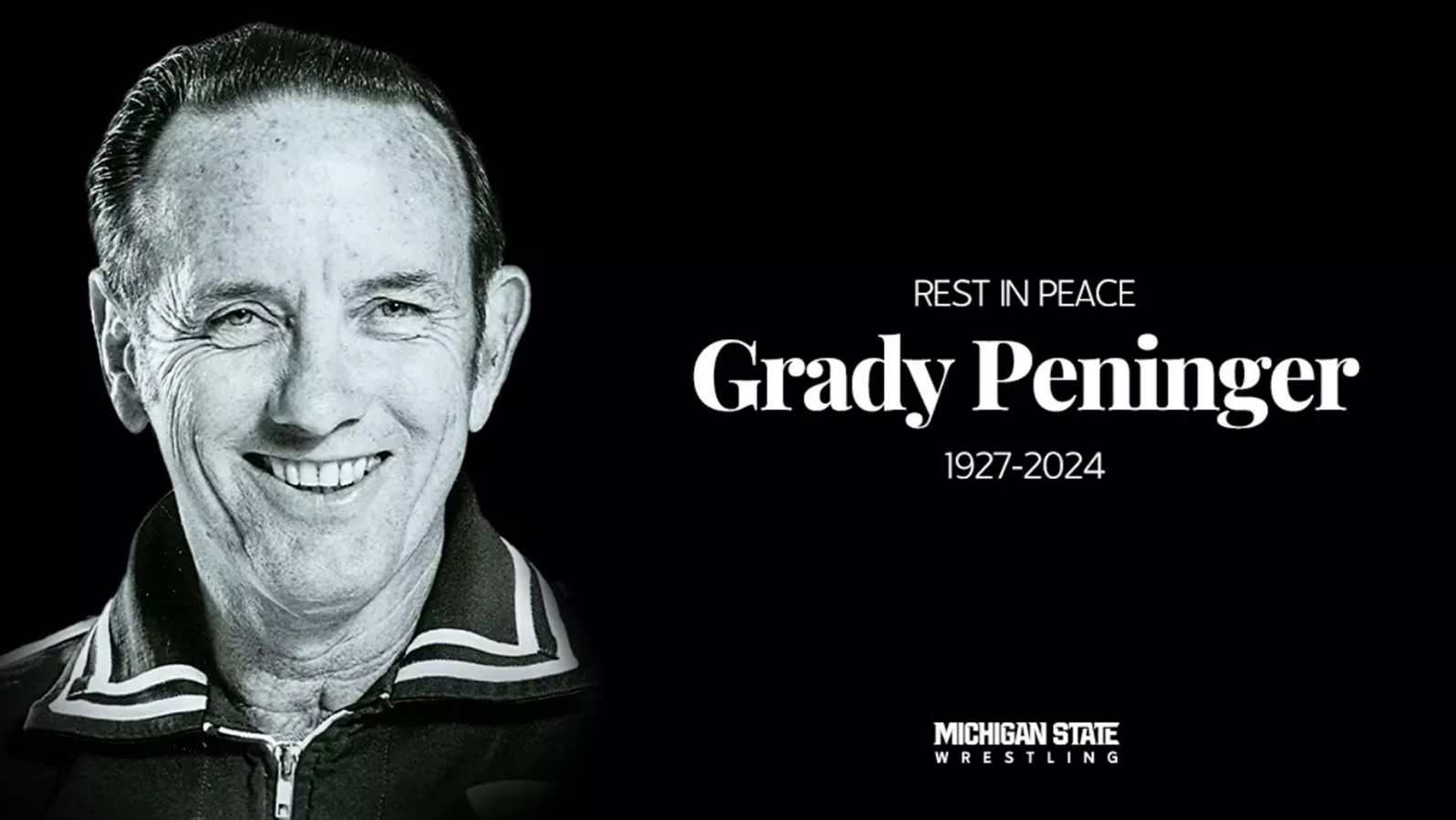
Distinguished Member Grady Peninger Passes Away
The National Wrestling Hall of Fame was saddened to learn that Grady Peninger, a Distinguished Member inducted into the Hall of Fame in 1987, passed away on Thursday, at the age of 97.
"On behalf of the National Wrestling Hall of Fame Board of Governors and our staff, I extend our sincere sympathies to Coach Peninger's family and the many wrestlers who wrestled for and worked with him," said Lee Roy Smith, Executive Director of the National Wrestling Hall of Fame. "He cemented his legacy among collegiate wrestling coaches when his 1967 Spartans won the NCAA championship. Growing up in Oklahoma provided him the leadership skills and a 'never met a stranger' personality that allowed him to achieve incredible success by always providing greater opportunities for wrestlers to succeed."
Only once, in a span of more than 30 years, did the NCAA team title escape from the states of Oklahoma and Iowa. And it took a native Oklahoman, Peninger, to carry the trophy off to Michigan State. His 1967 Spartans, featuring individual champs Dale Anderson and George Radman, provided just one of the highlights of his 40-year career.
He reached national prominence while still in high school in Tulsa, winning the state championship and the first of two National AAU crowns during his senior year of 1945. After a two-year hitch in the Navy, he enrolled at Oklahoma State, placing as an Olympic alternate in 1948 and as an NCAA finalist a year later.
Peninger was an NCAA finalist and earned All-American accolades in 1949 as runner-up at 121 pounds. He went undefeated in dual meet competitions from 1946-50. He registered a 15-3 record with five falls helping Oklahoma A&M go 35-0 during his four years and part of their school-record 76-match overall winning streak.
He also played a role in the school record for longest home winning streak, as he was head coach of Michigan State when the Spartans snapped OSU's home win streak at 56 matches on Jan. 20, 1967 with a 14-14 tie.
He entered high school coaching at Ponca City, Oklahoma, and in eight years from 1952-60 guided three state champion and two runner-up teams. His stars included Shelby Wilson and Doug Blubaugh, who went on to earn Olympic gold medals and win their way into the Hall of Fame as Distinguished Members. He began his coaching career as the freshman coach at Oklahoma A&M (currently Oklahoma State) in 1950.
In 1960, he was called by Michigan State to assist, soon to succeed, Fendley Collins, a Distinguished Member inducted in 1976, at the helm. Peninger's teams dominated the Big Ten Conference, winning seven consecutive titles starting in 1966. He was the first Big Ten coach to develop a three-time NCAA champion, Greg Johnson, and a four-time NCAA finalist, Pat Milkovich. Don Behm was an Olympic silver medalist, and Tom Milkovich, won four conference titles. Behm, Johnson and Pat Milkovich are all Distinguished Members of the Hall of Fame.
In all, he produced 40 conference and 10 national champions, 90 Big Ten medalists and 54 All-Americans. His Spartans won 213 of 330 dual meets and enjoyed 23 consecutive winning seasons. At the conclusion of his coaching career, Peninger was and remains the winningest head coach in program history with a record of 213-113. He was voted the Coach of the Year by the National Wrestling Coaches Association in 1967 and the Man of the Year by the NWCA in 1968.
Peninger was president of the National Wrestling Coaches Association. While serving on the NCAA rules committee, he pushed through an expanded consolation bracket in 1986, and the double elimination format in 1995, each creating more opportunity for the wrestlers.
He was inducted in the U.S. Wrestling Hall of Fame in 1987, the State of Michigan Wrestling Hall of Fame in 1991 and the Michigan State Athletics Hall of Fame in 2007. Peninger was the recipient of the 1998 Gallagher Award from Oklahoma State wrestling. The award, given annually to an OSU alumnus who has exemplified the spirit and leadership eminent in the tradition of champions.